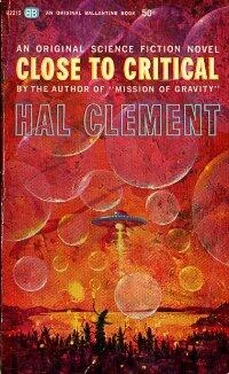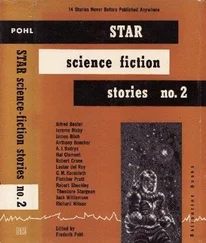There was no immediate answer, and a glance around the screens showed that both Nick and Betsey were with the herd, half a mile away. He sent the robot rolling toward them, meanwhile repeating his call in more penetrating tones. Both herders waved spears in token of understanding, and Nick began to trot toward the approaching machine. Raeker kept it coming, since he saw part of what he wanted at the foot of the hill.
Nick met him just before he reached it, and asked what had happened.
“I’ll tell you in a few moments, Nick,” he replied. “Could you go to the wagon and get a bucket, and then meet me at the pool down here?”
“Sure.” Nick loped back up the hill. Raeker had not had the robot bring the bucket because of a long-established habit of not using the machine’s moving parts, such as the handling equipment, more than could conveniently be helped.
The pool he had mentioned lay in the bottom of a circular hollow, as was usually the case. Also as usual, it filled only a small part of the hollow, representing all that was left when the nightly lake which did cover the spot boiled almost dry by day. He had assumed for years, on rather inadequate data but without any contradicting evidence so far, that the stuff was oleum—principally sulphuric acid with a heavy lacing of metal ions from the surrounding rocks which had been dissolved in the nightly rain, and an equilibrium amount of the atmospheric gases. He ran the robot through it to make sure of its depth— the slope of the rock sometimes changed rather abruptly at the “acid line,” so judging by eye was insufficient—and then waited until Nick returned with the bucket.
“Is that thing tight, Nick? Will it hold liquid without leaking?” In reply, Nick pushed the leather container beneath the surface of the pool, drew it up brimming, and waited for the fluid on the outer surface to drain away. This happened quickly, since the “leather” was not wet by the oleum, and in a few seconds only a dozen or so hazily defined drops were clinging to the outer surface. Nick held the container up at the end of one arm for another minute or so, but nothing more fell.
“I guess it’s tight, all right,” he said at length. “Why is it important? We’ll never have to carry this stuff very far; there are pools of it everywhere.”
“I’m not interested in keeping it in the bucket, Nick. Empty it again.” The student obeyed. “Now set the bucket right side up in the pool, and let go of it—no, don’t fill it.” The transmission delay made this warning a trifle late; Nick emptied what had gotten into the container and started over. “That’s right— on top of the pool. Now let go of it.” Nick obeyed. The weight of the strap that served as a handle promptly tipped it over, and three or four gallons of oleum poured in. This weighted the bottom sufficiently to bring the edge to the pool’s surface, and there the bucket remained. Nick was startled; he had taken for granted that the thing would plummet to the bottom.
“I’m afraid I’ve been a trifle negligent with your education,” remarked Raeker, “though I suppose the rather ambiguous nature of most of this planet’s liquid gives me some sort of excuse for leaving out Archimedes’ Principle. Try it again, Nick, and this time put a couple of stones in the bucket first.”
As might have been expected anywhere on Tenebra except the actively orogenic regions, there were no loose stones in the neighborhood; but by packing the bottom third of the container with broken-off shrubbery, Nick contrived to achieve the spirit of the Teacher’s order. This time the bucket floated almost upright, and with a good deal of freeboard.
“See how much more you can put in it before it sinks,” said Raeker. Nick obeyed, without asking for the meaning of the new verb; it was clear enough from context. To his unconcealed astonishment, it proved possible to fill the bucket with the brittle growths without actually forcing it under, though a ripple half an inch high would have accomplished this end—a fact Raeker at once proceeded to demonstrate. At his order, Nick splashed vigorously in the pool with his feet; waves curled over the edge of the bucket, and it sank almost at once.
“Do you think it would be possible to make something on that general line, capable of keeping several people from sinking?” asked Raeker.
Nick wasn’t sure. “Just on the face of things, I’d say yes,” he replied, “but I don’t really see why that works at all. If I knew, I could answer more sensibly. What use would it be if we had such a thing?”
Raeker took this opportunity to give a rapid explanation of Archimedes’ Principle, plus an account of Easy’s reports, mentioning the brief appearance of the cave scout and concluding with the probability that the bathyscaphe had reached the sea. Nick could see the rest of the situation for himself, and, characteristically, went a trifle overboard in his enthusiasm.
“I see!” he exclaimed. “The ship is in the ocean where no one can get at it, so you’ve showed us how to travel on the ocean itself. We could get out to the ship with this big bucket you want us to make, and pull the ship along with us to the other side, where Swift wouldn’t bother us. It’s a good idea. We’ll start making the bucket as soon as the others come back—in fact, we can start collecting leather for it right now—”
“Hold up a minute, Nick. Crossing oceans, even oceans as small as Tenebra probably has, isn’t something you do quite that casually. Also, there’s another point to be considered. What if you were out in this—this bucket at night?”
Nick thought briefly. “Why couldn’t we carry firewood and torches?”
“You could; but that’s not the point. What happens to the ocean at night?”
“It conies up; but wouldn’t the bucket go up with it?”
“I’m afraid not. In going up, the ocean decreases enormously in density, and I’m afraid that rather early in the evening you’d find it oozing over the side of your bucket—and you saw what happened just now when the same thing occurred here in front of us.”
“Yes,” admitted Nick thoughtfully. He was silent for a time. Then he became enthusiastic again. “Wait a minute. The bucket sinks because liquid gets into it, and it is no longer lighter than the liquid it displaces—right?”
“That’s right.”
“Suppose, then, that instead of a bucket we have a closed bag of air? If it’s tied shut the sea can’t get in, no matter how much it rises.”
“But if the sea becomes no more dense than the air?”
“At least when the water boils out of the sea in the morning the bag will float once more.”
“All that is true only if your bag doesn’t leak at all. I’d rather you didn’t risk your lives by staying at sea during the night, though your idea of bags rather than buckets is a good one. It would be smart to make a ship of many bags tied together, so that if some of them do leak you will still float.”
“That’s plain enough. But why shouldn’t we stay out at night? What if night falls before we get the ship across the ocean.”
“You won’t cross the ocean. You’ll work on it during the daytime, and come ashore again at night.”
“But how about Swift?”
“I’ll take care of him. Don’t you plan to keep the agreement we offered to make with him?”
Nick thought for a moment. “I suppose so, if he really agrees. If that was one of his scouts who found the ship last night, maybe he just decided to find it for himself.”
“I still think that find was sheer chance. If it should turn out that you’re right, we’ll solve that one when we face it. Easy is willing to face Swift, she says. Right, young lady?”
“Certainly.”
Читать дальше












